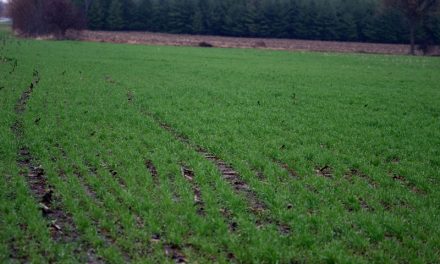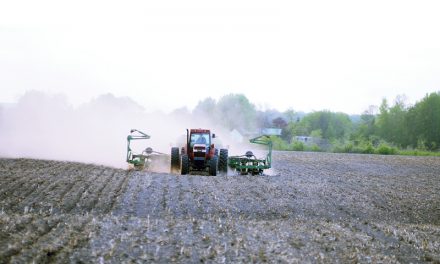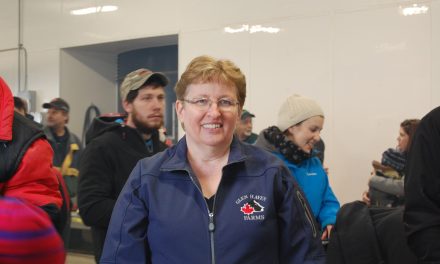Hilary Moore and Mike MacGillivray led a frank discussion at Eco Farm Day of the need for change in the abattoir business, as small producers in Eastern Ontario now face extended lead times and long transport distances to get service. Van Dusen photo
CORNWALL – Eco Farm Day, the 30-plus-year-old conference which actually unfolds over two days and is known to offer the best lunch of any agricultural event in Eastern Ontario, has extended its mandate.
With this year’s theme “On Common Ground: Food and Farming in a Shifting Climate,” the event previously dedicated primarily to organic growing for niche farmers has widened its scope by looking at the increasing impact of climate change, the farm income crisis, and the loss of farmland. The 2020 event unrolled on Feb. 22 and 23 in Cornwall.
“When we recognize that we face common struggles, we find support and solutions in one another,” the organizing team stated, inviting participants in the 2020 conference to spend time learning from, and connecting with, each other while acting collectively to “co-create regenerative and resilient food and farming systems.”
With that in mind, the keynote speaker at Eco Farm Day was Dr. Kris Nichols, a leader in the regenerative agriculture movement and a microbiologist, who discussed soil health and climate solutions. Another speaker, Ellen Polishuk, facilitated a workshop on strategies for farm/life balance.
While the conference featured the usual sessions on plant resilience, fine-tuning compost, and collective farm business models, there were meatier topics too, notably, tackling the abattoir crisis in Eastern Ontario, with input from small farmers Hilary Moore and Mike MacGillivray.
The speakers revealed that several farmers and farm groups are organizing to lobby for relief as local slaughterhouses continue to close, causing longer wait times, longer distances to travel, and increased costs. At a time of expanding opportunities across the region for small-scale production, such as the Chicken Farmers of Ontario artisanal program, the lack of slaughter infrastructure makes it extremely difficult to take advantage of those opportunities.
Moore, whose Maplelane Farm is in Lanark County, must book slaughter services six months ahead at a facility 90 minutes away near Kingston; MacGillivray’s Kirkview Farms in Glengarry County requires a similar amount of slaughter booking lead time and similar travel time.
The speakers maintained that aging abattoir owners are being driven out of business by crippling, often conflicting regulations, and costly haphazard inspections. An audience member chimed in to claim the “culture of inspection sucks!”, with provincial inspectors – often with little understanding of livestock production – uncovering increasing numbers of infractions to justify their jobs.
Because their difficulties with the inspection system and standards enforcement along with hiring and retaining employees are well known, abattoir owners wishing to retire often can’t find buyers and discover their children aren’t interested in the family business. The “nail in the coffin” for many came after a regulation was introduced requiring carcasses to be disinfected with vinegar, which slowed the process by one third.
Producers are “constantly under threat” due to limited slaughter capacity, MacGillivray said. A political discussion and regulation review is needed now to ease the abattoir crisis, he insisted. Moore said the National Farmers Union is currently working on regulation relief, and suggested one solution would be legalizing mobile slaughter operators to travel from farm to farm. She also noted the excessive waste of hides which once carried a price and are now scrapped.












